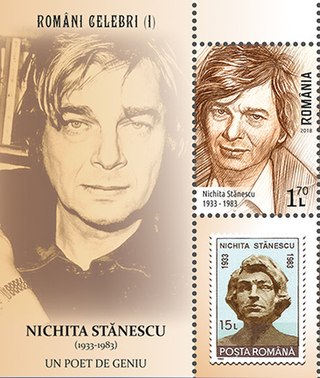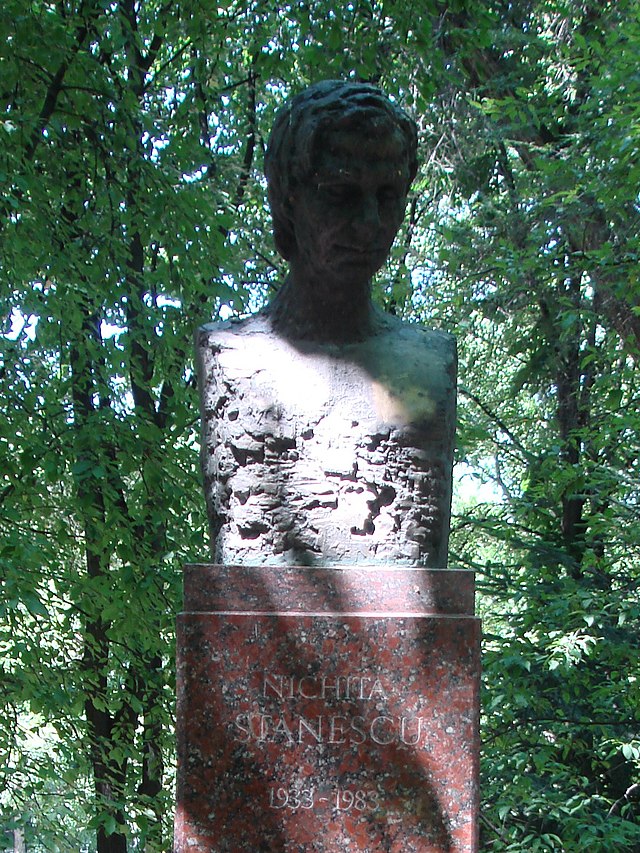Loading AI tools
Romanian poet and essayist From Wikipedia, the free encyclopedia
Nichita Stănescu (Romanian pronunciation: [niˈkita stəˈnesku]; born Nichita Hristea Stănescu; 31 March 1933 – 13 December 1983) was a Romanian poet and essayist.
Nichita Hristea Stănescu | |
|---|---|
 Portrait of Nichita Stănescu by Paul Mecet | |
| Born | 31 March 1933 |
| Died | 13 December 1983 (aged 50) |
| Resting place | Bellu Cemetery, Bucharest, Romania |
| Education | Ion Luca Caragiale High School (Ploiești) |
| Alma mater | University of Bucharest |
| Years active | 1960–1982 (1960–1998; posthumous) |
| Known for | Poet |
| Notable work | 11 elegii, Noduri si semne |
| Political party | Romanian Communist Party |
| Spouses | Magdalena Petrescu
(m. 1952; div. 1953) Doina Ciurea
(m. 1962; div. 1972) Todorița ”Dora” Tărâță
(m. 1982–1983) |
| Partner | Gabriela Melinescu (?–before 1982) |
| Awards | Herder Prize, 1975 Golden Wreath Struga Poetry Evenings, 1982 |
| Signature | |


Stănescu's father was Nicolae Hristea Stănescu (1908–1982). His mother, Tatiana Cereaciuchin, was Russian (originally from Voronezh, she had fled Russia and married in 1931). Nichita Stănescu graduated from the Ion Luca Caragiale High School in Ploiești, then went on to study Romanian language and literature at the University of Bucharest, graduating in 1957. He made his literary debut in the Tribuna literary magazine.
Stănescu married Magdalena Petrescu in 1952, but the couple separated a year later. In 1962 he married Doina Ciurea. In 1982 he married Todorița "Dora" Tărâță.
For much of his career, Stănescu was a contributor to and editor of Gazeta Literară, România Literară, and Luceafărul.
His editorial debut was the poetry book Sensul iubirii ("The Aim of Love"), which appeared under the Luceafărul selection, in 1960. He also was the recipient of numerous awards for his verse, the most important being the Herder Prize in 1975 and a nomination for the Nobel Prize in 1980. The last volume of poetry published in his lifetime was Noduri și semne ("Knots and Signs"), published in 1982. A heavy drinker, he died of cardiopulmonary arrest.[1] He is buried in Bucharest's Bellu Cemetery.

There is a national poetry festival and an award named Stănescu in his honor.[2]
There are high schools named after him in Ploiești[3] and in Sector 3 of Bucharest.[4] Streets in Blejoi, Cluj-Napoca, Dej, Mogoșoaia, Pipera (Voluntari), Ploiești, and Vama Veche are named in his honor.
Seamless Wikipedia browsing. On steroids.
Every time you click a link to Wikipedia, Wiktionary or Wikiquote in your browser's search results, it will show the modern Wikiwand interface.
Wikiwand extension is a five stars, simple, with minimum permission required to keep your browsing private, safe and transparent.